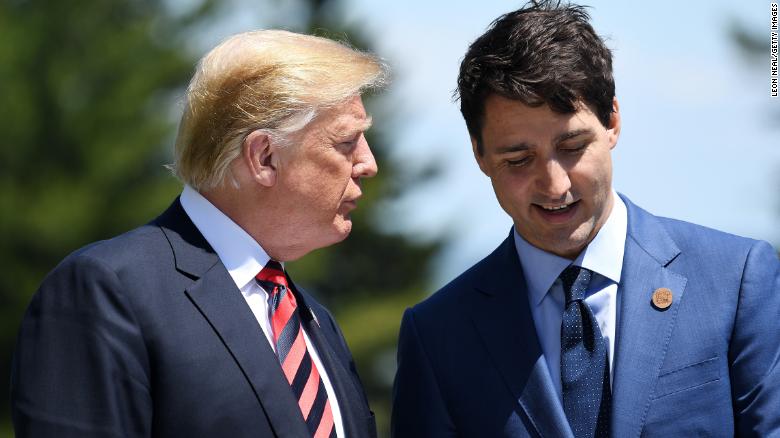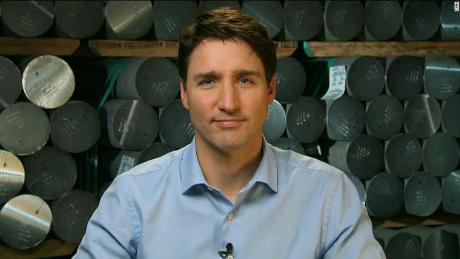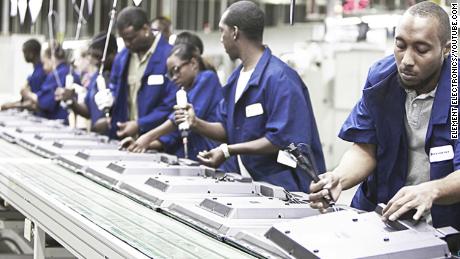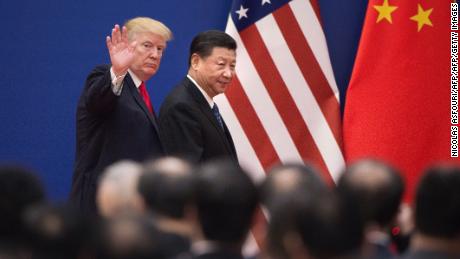Washington (CNN Politics)President Donald Trump said this week that his replacement for the North American Free Trade Agreement "is one of the great trade deals, you'll see."
But that didn't stop American automakers, produce growers, retailers and labor groups from expressing concerns this week at the first hearing held since the deal, known as the United States-Mexico-Canada Agreement, or USMCA, was announced in September.
The two-day hearing in Washington before the International Trade Commission offered a road map to issues that could sink the deal when Congress reviews it early next year. While lawmakers can't offer a total rewrite, they can make changes to the language of the bill -- or hold up a vote until side deals are struck between countries on thorny issues.
There's no deadline for ratification, but lawmakers are likely to wait to vote until the ITC releases its report on the economic impact. The commission has until 105 days after the signing, or mid-March, to deliver its report to Congress.
Here are five things that could cause headaches for Trump along the way:
Cars
The USMCA tightens rules for manufacturing cars and trucks. In order to remain duty free, the USMCA increases the portion of a vehicle's parts that must be made in the United States, Canada or Mexico. It also adds a wage stipulation, requiring that some of the parts are made by workers earning at least $16 an hour.
Some of the auto industry representatives said it would be complicated and costly to comply with these new rules. But former Missouri Republican Gov. Matt Blunt, who represents the big three automakers -- Fiat Chrysler, GM and Ford -- called the new rules "workable." In general, he said, the group is optimistic the USMCA will "help maintain the competitiveness" of the industry.
Blunt said he thinks the new content rules will bring more investment to the United States in the long term, but noted "we don't see any immediate impact."
The idea is that content restrictions will bring manufacturing back into North America, and that raising wages in Mexico would put upward pressure on those in the United States and Canada, too. Mexico has also committed to recognize workers' right to collectively bargain.
But some Democrats, as well as the US union groups, are skeptical that these provisions will have a significant impact for labor.
"If the commission simply assumes that words on the page are sufficient to transform Mexico's repressive labor regime, it will make a grave error," said Celeste Drake, the trade and globalization policy specialist at the AFL-CIO, on Thursday.
"There is nothing in the text that would limit the current unfettered discretion to ignore blatant labor violations," she added.
The union, as well as the Teamsters who historically oppose free trade deals, have not yet taken a final position on the USMCA, awaiting further analysis and the ITC report. Their support could be critical for getting enough Democratic votes.
Strawberries
Fruit and vegetable growers in Florida and Georgia are upset that the USMCA does nothing to protect them from lower-priced produce coming from Mexico. A lot of what's grown in the Southeastern United States, including strawberries, blueberries, tomatoes and bell peppers, are also grown across the border during the same seasons.
"Unfortunately, the trade environment created under NAFTA, and the trade environment that will be created under USMCA is anything but a fair and level playing field for Florida's producers," said Adam Putnam, the state's commissioner of agriculture.
He and other industry representatives said that low labor costs and subsidies from the government allows Mexican growers to sell fruit and vegetables in the United States for less than the cost of production. Imports have escalated since the original NAFTA took effect.
Kenneth Parker, the executive director of the Florida Strawberry Growers Association, said the USMCA would be "devastating" for Florida growers.
The trade agreement "plac(es) at peril the economic livelihood of Florida strawberry growers and their communities," Parker said.
Beer cans
The tariffs that Trump has imposed on steel and aluminum imports were the elephant in the room throughout the two-day hearing. The USMCA would not lift those duties for Canada or Mexico, and many groups -- from automakers to breweries -- said the tariffs could cancel out the benefits generated by the new trade deal.
Beer Institute CEO Jim McGreevy said more than 60% of beer made in the United States is packaged in aluminum cans, and that the tariffs are driving up the cost. The USMCA, he said, does not include any provisions that would hurt beer trade, but the tariffs should have been addressed in the negotiations.
The tariffs, which Trump imposed to protect the domestic steel and aluminum industries in the interest of national security, are a separate issue and can be lifted by the administration outside of the trade deal. But the issue could be addressed in the agreement, or Congress could hold off on approving the USMCA until the tariffs are eliminated.
"Exempting Mexico and Canada from the Section 232 tariffs on steel and aluminum strengthens the agreement and will in turn strengthen the US manufacturing base," said Ann Wilson, who represents the Motor and Equipment Manufacturers Association.
US steel producers have benefited from the tariffs, but Heidi Brock, CEO of the Aluminum Association, said that's not the case for her members. A majority of aluminum jobs in the US are not in primary production, but at manufacturers that import the metal from foreign countries. She said there is a problem with subsidized aluminum coming from China, but that the tariffs on Canadian and Mexican aluminum should be lifted.
The tariffs "will hamper continued growth and investment for our industry here at home," Brock said.
Pockets
Yes, pockets. Both the apparel and textile industries have benefited from NAFTA and said they could support a lot of what's in its replacement. But they disagree over one provision that apparel makers say could make it harder for them to manufacture inside North America.
The USMCA requires apparel products to use more North American-made fabrics in order to qualify for trade benefits. It specifically mentions sewing thread, pocketing fabric and narrow elastic bands.
Those restrictions "will make it more expensive and complicated for American brands and retailers to use the agreement" said Julia Hughes, president of the United States Fashion Industry Association.
"We are concerned that there will be some companies who shift operations out of the Western Hemisphere, or decide not to move new orders to Canada or Mexico because of these cost increases," she added.
The requirement is welcomed by the textile industry. Augustine Tantillo, president of the National Council of Textile Organizations, said North American factories can meet the demand and will offer a boost to US producers.
But Rick Helfenbein, president of the American Apparel and Footwear Association, is unsure that shifting suppliers would be easy.
The new restriction "may lead to less -- not more -- US content being used in North American supply chains," he said.
Prescription drugs
The generic drug lobby and a group that focuses on improving innovation and access to new medical technologies expressed serious concerns about the USMCA on Friday.
Most contentious is a provision that will provide a 10-year period of marketing exclusivity for brand name drugs.
"In it's current form, the USMCA will decrease competition for some medicines and lead to higher prescription drug prices for Americans," said Jeffrey Francer, general counsel for the Association for Accessible Medications.
In a recent letter to US Trade Representative Robert Lighthizer, the group was joined by the AARP, Blue Cross Blue Shield Association and more than 20 other groups to oppose the agreement.
But the brand-name drug lobbying group Pharmaceutical Research and Manufacturers of America supports the agreement, particularly for its intellectual property protections that they say will "pave the way for the next generation of treatments and cures," according to a statement released in October.
Correction: This story previously misidentified Beer Institute CEO Jim McGreevy as the former governor of New Jersey.





















